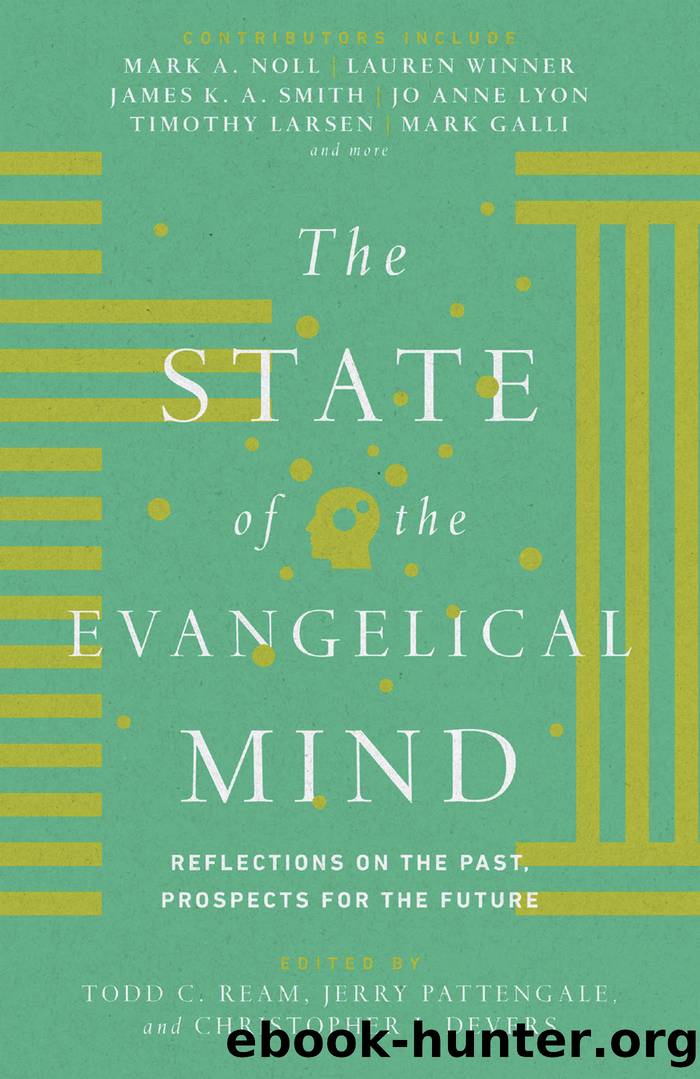The State of the Evangelical Mind by Todd C. ream

Author:Todd C. ream
Language: eng
Format: epub
Tags: evangelicalism;intellectual life;evangelical;intellectual;intellectual Christian;Christian intellect;institutions;Christian institutions;evangelical mind;intellectual engagement;state of the evangelical mind;Richard J. Mouw;Mark A. Noll;Anne Lyon;David C. Mahan;C. Donald Smedley;Timothy Larsen;Lauren Winner;James K. A. Smith;Mark Galli
Publisher: InterVarsity Press
Published: 2018-11-15T00:00:00+00:00
THE INHERENT WORTH OF OBTAINING SUBSTANTIAL KNOWLEDGE
There is such a thing as trivial rather than substantial knowledge. One could gain much substantial knowledge by reading books in the college library. If, however, one decided that what one wanted to learn was what the seventh word on the thirty-eighth page is in as many books in the college library as possible, thenâhaving successfully pursued this quest over hundreds of volumesâone would have gained knowledge that was only trivial rather than substantial, more pointless than profound. All substantial knowledge, however, is not narrowly utilitarianâit is not purely practical knowledge calculated directly to explain to someone how to undertake the duties of a particular job in full-time, paid employment. Newman is aware that this is the only kind of knowledge some people seem to value: âAnd now the question is asked me, What is the use of it?â4 He put the word use in italics in order to indicate that his questioner has a narrow and specific meaning of useful knowledgeânamely, its utility in terms of vocation, career, and monetary gain. As he will later affirm, âa liberal education is truly and fully a usefulâ education (117). But when it comes to the question, âWhat is the use of it?â the way the questioner means it, Newmanâs retort is, âKnowledge is capable of being its own endâ (78).
Part of the nature of our species includes being rational creatures who take delight in learning. I have developed my own somewhat playful or provocative definition of a liberal arts education. It goes like this: a liberal arts education is the pursuit and cultivation of those noble activities that distinguish human beings from the lower animals. As there is trivial rather than substantial knowledge, so there are ignoble activities that distinguish human beings from other animalsâwe, for example, are set apart from birds and dogs by our ability to break promises. A liberal arts education is about what makes us noble rather than ignoble as a species. My definition is meant to be a kind of thought experiment that pushes back at the ruthless utilitarian drive that can relentlessly hum in our heads on incessant loop: how do these college courses train me to make money in a well-paying career? The quest for food, water, shelter, and a mate are precisely those goals that we share with fruit bats and raccoons and all the other lower animals. These are necessary and honorable pursuits, but are they an exhaustive list? In other words, do human beings have no higher ends than rodents?
I submit to you that we do, and that a liberal arts education is a precious time in oneâs life when one can also attend to those more elevated ends. Newman observes that we think of having a healthy, fit body as a good in itself rather than just as a means to an end: âCultivation of the mind,â he reflects, âis surely worth seeking for its own sakeâ as well (85). For âif a healthy body is a good in itself, why is not a healthy intellect?â (115).
Download
This site does not store any files on its server. We only index and link to content provided by other sites. Please contact the content providers to delete copyright contents if any and email us, we'll remove relevant links or contents immediately.
Christian Ethics by Wilkens Steve;(860)
Christian Ethics for a Digital Society by Kate Ott(779)
Fearfully and Wonderfully Made by Philip Yancey & Paul Brand(771)
God and the Multiverse by Victor J. Stenger(677)
Numbers by Ronald B. Allen(641)
How to Read Slowly by James W. Sire(618)
Christian Ethics: An Introduction to Biblical Moral Reasoning by Wayne Grudem(598)
The City of God by Saint Augustine & Marcus Dods(592)
Morality by Jonathan Sacks(570)
Monastic Archaeology by Unknown(568)
The Technological System by Jacques Ellul(552)
Amish Grace by Donald B. Kraybill & Nolt Steven M. & Weaver-Zercher David L(536)
Death of the Doctor by Unknown(529)
The Disabled Church by Rebecca F. Spurrier;(523)
Jesus: A New Vision by Whitley Strieber(523)
Children of Lucifer; The Origins of Modern Religious Satanism by Ruben van Luijk(513)
Critical Writings by Joyce James;(503)
Redeeming Sociology by Vern S. Poythress(488)
The Church in the Early Middle Ages by G.R. Evans(478)
